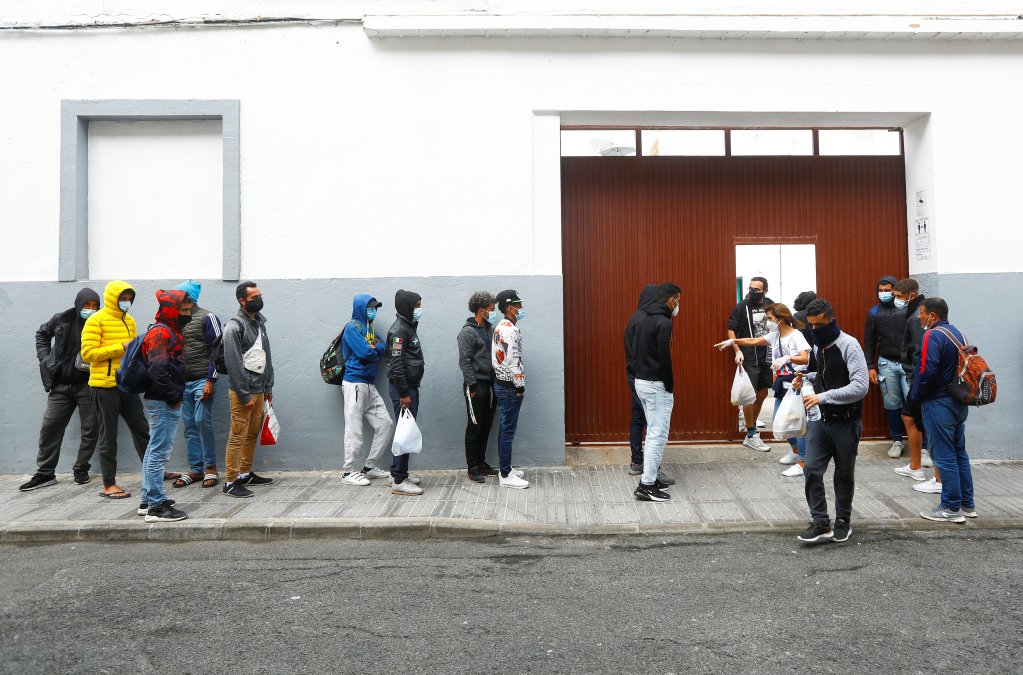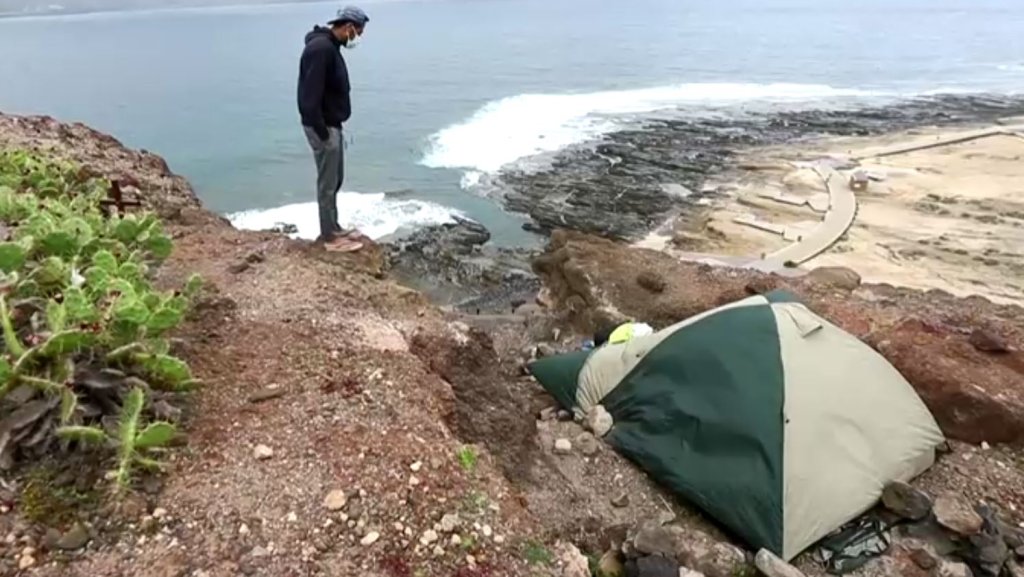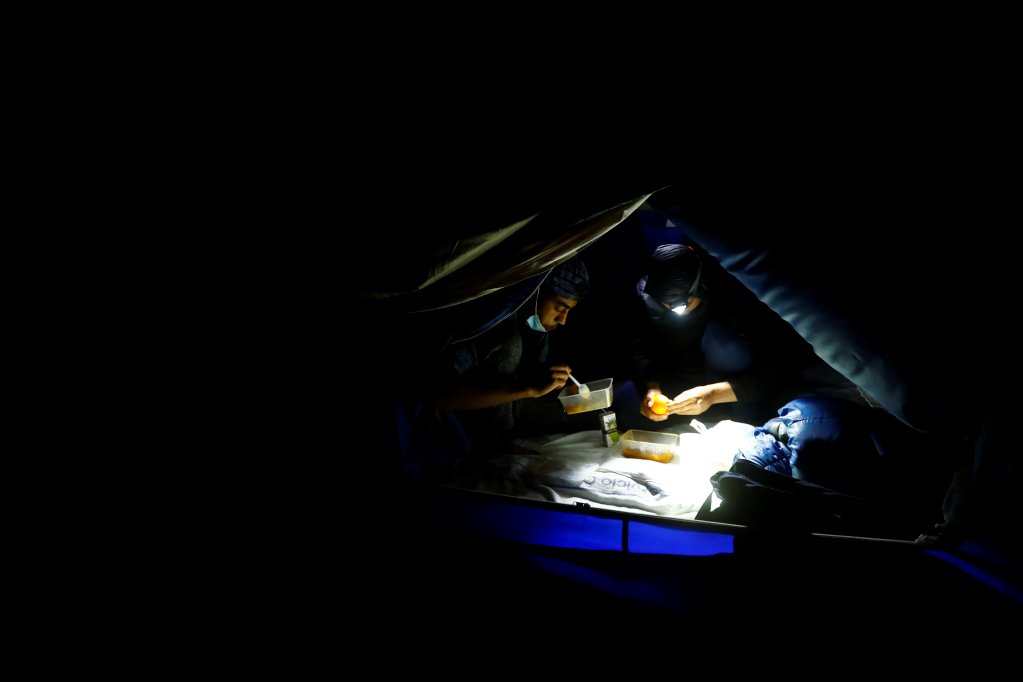Gran Canaria: Migrants sleep on the streets to avoid deportation

Migrants erect tents near Las Palmas, Gran Canaria, March 2021 | Photo: Reuters
Frightened of being sent back to their country of origin, migrants are leaving their accommodation centers in Gran Canaria to sleep on the streets of the Spanish island. Sometimes they find refuge high up on the edge of the cliffs.
For the past month, around 60 migrants have set up a makeshift camp not far from Las Palmas, the capital of Gran Canaria. Perched on a windswept cliff, this unofficial camp may be one of the largest, but it is not the only one. Other smaller ones have also sprung up in recent weeks on Gran Canaria, the largest of the Canary Islands.
Some migrants sleep together in small groups in parks or hide at night in ravines and even under trucks. “In general, the camps don’t get too large because, as soon as they settle somewhere, they are chased away by the police,” Maria of the Somos Red association, an organization set up in February to provide these rough sleepers with water, food, and clothing, told InfoMigrants.

Rough sleepers queue up outside the premises of an NGO to collect some food | Photo: Reuters
The first migrants to sleep on the island’s streets were mostly Moroccans. They had been kicked out of hostels for breaking the code of conduct or for being away for more than three days. But in recent weeks the profile of the migrants sleeping on the streets has changed.
Also read: Canary Islands: Migrants turn to hunger strikes, self-harm
Rumors of deportation
The majority of migrants are now from West Africa, who voluntarily leave the Red Cross centers where they are being housed. “They are leaving these reception centers because they are afraid of being transferred to Las Raíces and then being sent back to their country of origin,” says Mamé Cheikh, president of the Federation of African Associations of the Canary Islands, contacted by InfoMigrants.
The Las Raíces center is a large accommodation center with 1,400 places on Tenerife, the neighboring island to Gran Canaria.
“Rumors started to circulate that deportations were happening from this center. As a result, migrants prefer to sleep out on the streets than to be sent to Las Raíces,” says Maria from Somos Red.

A migrant’s tent on the cliffs of Gran Canaria | Photo: Reuters screengrab
This is the case for Ousmane Diop, a 27-year-old Senegalese man interviewed by the Spanish daily El Pais. He had been staying in a tourist hotel on Gran Canaria for several months but decided to go to the camp near Las Palmas on the edge of the cliffs when he heard that he would soon be transferred to the Las Raíces center. “In the hotel I was just eating and sleeping. In the center, I knew it would be worse, and from there they were going to send me back to Senegal,” he says.
The same explanation was given by Samba, another Senegalese migrant interviewed by El Pais: “In Puerto Rico, we were told that if we were sent to Las Raíces, it would be the first step to being sent back to Senegal. And I don’t want that. I just want help to be able to start working,” says the young man.
Also read: Spain: New migrant camps in the Canary Islands
Migrants stranded in the Canary Islands
But for Cheikh, this hasty departure by migrants from their hostels is based on the spread of misinformation and a lack of real information.
“It all started with rumors about deportations,” he says. “But since the beginning of the year, no one has been deported to Sub-Saharan Africa from Tenerife.” According to Cheikh, the authorities are actually transferring migrants to the neighboring island purely for staffing reasons, as Tenerife is less overwhelmed than Gran Canaria in terms of its migrant numbers. “If they want to get to the mainland, they have a better chance of doing so from the centers. No one will help them if they are out on the street,” insists Cheikh.

Migrants in a tent at night near Las Palmas | Photo: Reuters
The fact remains that for the migrants who have arrived in the Canaries in recent months, the archipelago has become something of an open-air prison. Transfers to the mainland are made in dribs and drabs and only concern those that have been categorized as vulnerable. The others have no prospects and are stuck in the Canaries, still so far removed from their European dream.